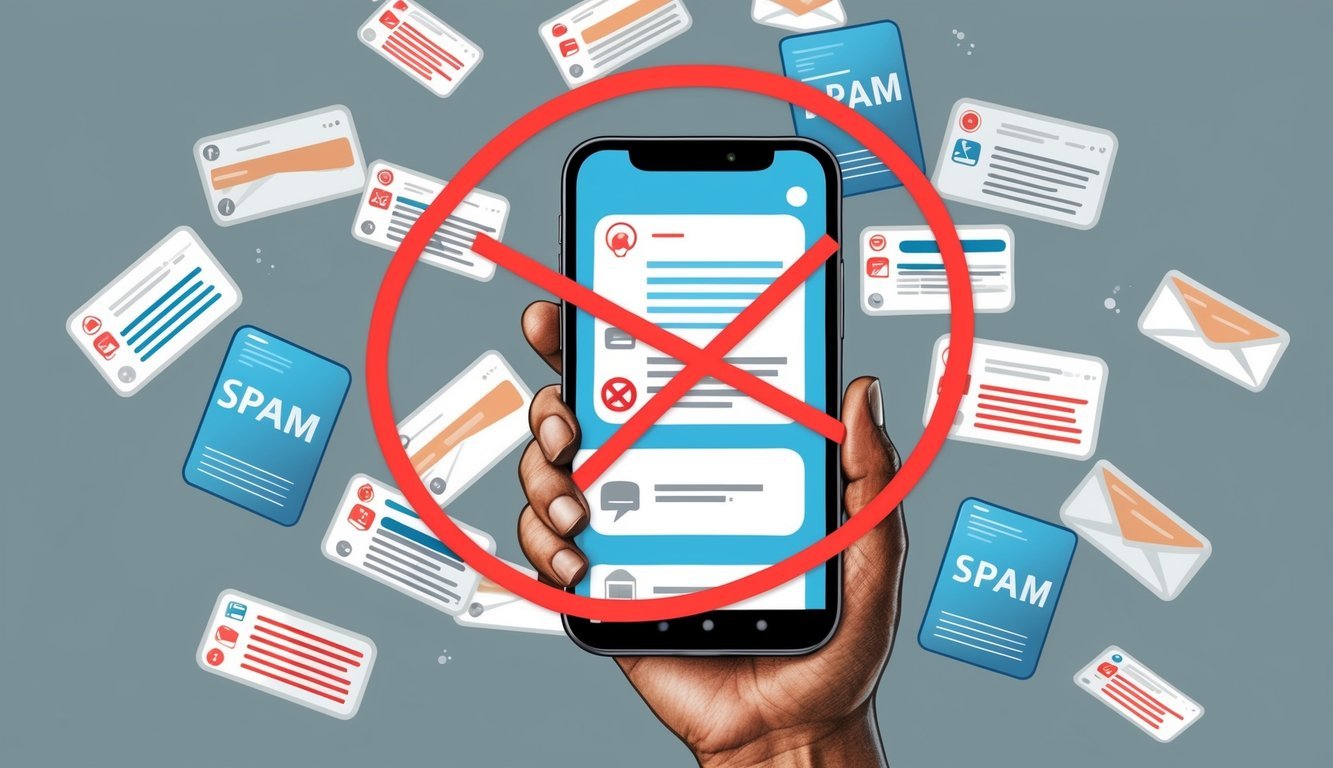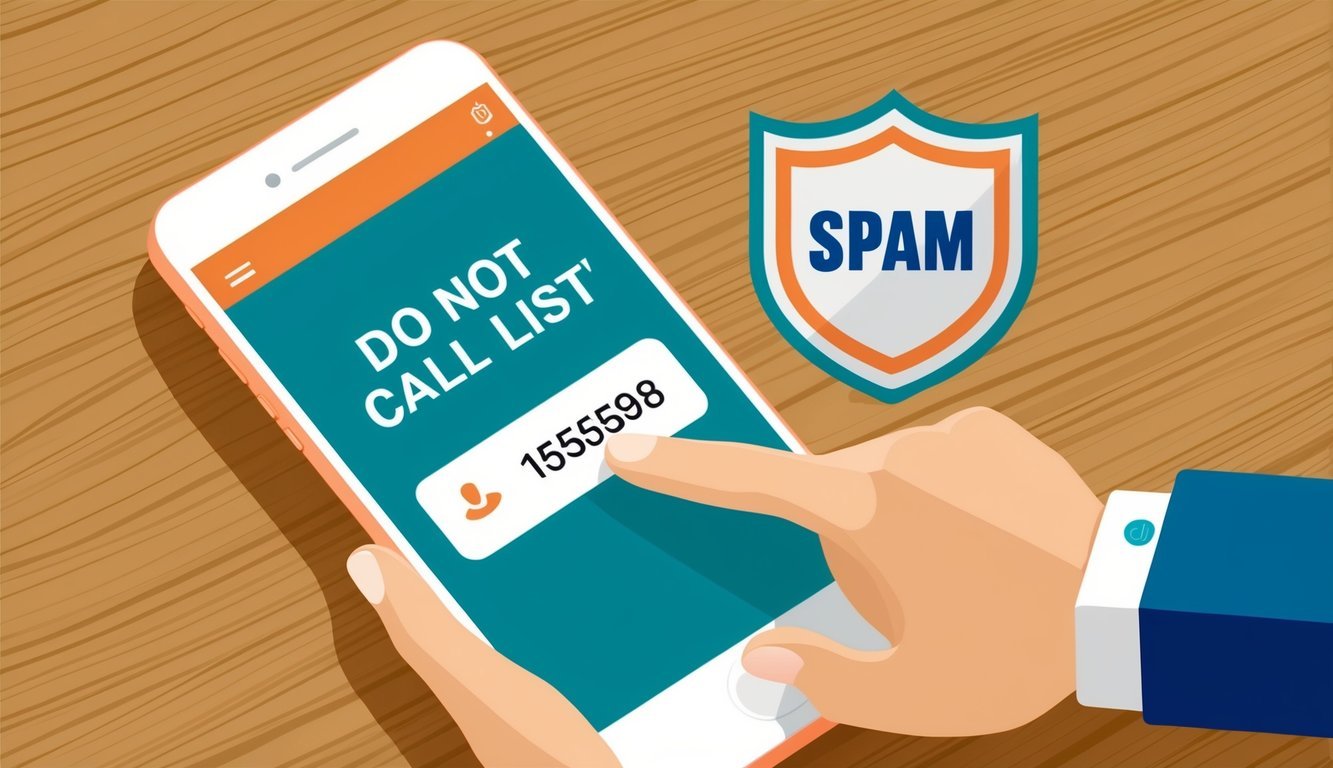Thinking about pulling a prank on a friend or settling the score with someone? It can be tempting to sign them up for a barrage of spam texts, but trust me, that’s not the way to go. Signing someone up for spam texts is illegal and could land you in hot water with hefty fines or even legal action.
alt=”A phone with a spam message notification, a hand holding a phone, and a spam number being entered into a form”>
Instead of resorting to those tricks, why not try talking it out? Sometimes, a simple conversation or getting some advice from a trusted friend can work wonders.
If you’re the one getting flooded with unwanted texts, there are ways to put a stop to it.
Check out The National Do Not Call Registry.
It’s a handy tool to help block most telemarketing calls and texts.
Spam texts can be a major annoyance and might even pose a threat.
Some of those messages are designed to trick you or even infect your phone with malware.
The best course? Just ignore them.
If spam texts come your way, don’t reply or click any links—simply delete them and carry on with your day.
Key Takeaways
- Don’t sign others up for spam texts; it’s illegal and could get you in trouble.
- There are legal options for reducing unwanted calls and texts on your own phone.
- Stay safe by ignoring and deleting spam texts—they’re often linked to scams and malware.
Spam Messages: What and Why?

Spam texts are more than just bothersome; they can be dangerous.
Let’s break down how they operate, why they’re a nuisance, and where they often originate from.
These pesky messages frequently tempt people into divulging personal info or clicking on malicious links.
Scammers usually deploy automated systems to bombard individuals with messages, making it challenging to shut them down entirely.
Knowing how spam texts are generated can empower you to avoid falling into their traps.
The Mechanics Behind Spam Texts
Spam texts often rely on sophisticated technology to send out a blitz of messages in no time.
Scammers might use computer programs to blast millions of texts at once, pulling numbers from lists they’ve either purchased or stolen.
Here are a few tricks they might employ:
- Fake caller IDs
- Links that look legit but are actually a trap
- Urgent-sounding messages that pressure you to react
They might entice you with:
• Fake prizes
• Phony deals
• Scary warnings
The Legal and Privacy Issues at Play
Sending spam texts isn’t just obnoxious; it’s often illegal.
The CAN-SPAM Act mandates that you get permission before sending marketing texts.
Plus, the Telephone Consumer Protection Act (TCPA) has its own set of rules.
From a privacy standpoint, spam texts can be invasive.
They might try to pry into your:
- Bank information
- Social Security number
- Passwords
The FTC and FCC are on the case, cracking down on violators, and they can slap fines on those who don’t play by the rules.
Signing up for the Do Not Call list can help you cut down on some of that spam.
Spotting Common Sources
Spam texts can arrive from anywhere.
Some common sources include:
- Shady businesses
- Scammers
- Hackers who’ve obtained your information
Your phone number might end up on these lists from:
• Online surveys
• Social media profiles
• Contest entries
Even free trials can lead to more spam than you bargained for.
Be cautious with what you share online—don’t just hand over your number to anyone.
Steps to Take and Solutions

Protecting yourself from spam texts and calls may take a little effort, but it’s totally worth it.
Here are some handy tips to help keep the nuisances at bay.
Smart Moves to Protect Yourself
To start, don’t tap on links in suspicious texts.
Scammers thrive on tricking people into clicking dodgy web addresses.
Just delete those messages right away.
Make sure you use strong passwords for your accounts, and don’t skip on two-factor authentication when you can.
It adds an extra layer of security that makes it tougher for intruders.
Be mindful when sharing your number online.
The less exposure, the fewer chances spammers have to target you.
Think twice before signing up for contests or giveaways that ask for your digits.
If you receive a spam text, don’t reply—even to say “STOP.” That just confirms your number is active.
Blocking the number can help, but keep in mind that crafty spammers often use fake numbers.
Making Use of Consumer Resources
A great place to begin is the Do Not Call Registry.
Signing up is free and tells legitimate companies not to bother you.
However, don’t forget that scammers don’t follow the rules, so they might still try their luck.
Check out your phone’s built-in blocking features—a lot of smartphones now come with options to filter known spam numbers.
You can even download call-blocking apps for extra protection against unwanted messages.
Your wireless provider may also offer spam-fighting tools, so it’s worth reaching out to see what they’ve got available.
Handling Spam Like a Pro
If spam slips through the cracks, don’t engage.
Hang up on robocalls and delete strange texts.
The less you interact, the better your chances of staying spam-free.
Keep a record of annoying messages and calls—jot down the numbers, dates, and what they said.
This info can help you report spam to the FCC if needed.
Stay sharp and trust your gut.
If something feels off, it probably is.
Real companies won’t ask for personal info through a text.
If you’re unsure, look up their official number and reach out directly.
Your Questions Answered
Many people wonder how to block unwanted texts, the ins and outs of receiving promotional texts, and what consequences come from signing someone up for spam.
Let’s tackle your burning questions about managing those pesky texts and telemarketing calls.
How can I block unwanted texts on an iPhone?
Blocking texts on an iPhone is easy! Open the message, tap the sender’s name, select “Info,” and then “Block this Caller.”
Additionally, you can report spam texts to your carrier by forwarding them to 7726 (that’s SPAM).
How do I voluntarily receive promotional texts?
If you’re looking to get promotional texts, check for “Text Club” sign-ups on company websites or in stores.
You may need to text a keyword to a short code or fill out an online form.
Just be sure to read the terms before signing up!
Are there legal consequences for signing someone up for unsolicited texts?
You bet there are! Signing someone up for texts without their consent is against the law and can lead to fines or legal issues under the Telephone Consumer Protection Act.
Can I report my number to receive spam text messages for free?
Posting your number online might result in more spam, but it’s risky business and strongly discouraged.
It’s way better to focus on blocking unwanted messages.
Where can I talk about my experiences with unwanted calls?
Online forums and social media groups can be great for discussing unwanted calls and texts.
Look out for consumer protection groups or telecom-themed communities to share your experiences and gather advice.
What options exist to opt-in for telemarketing calls?
Most folks try to steer clear of telemarketing calls, but if you’re keen on receiving them, you can remove your number from the National Do Not Call Registry.
Additionally, you can give permission to companies to call you when you’re making purchases or filling out forms.

